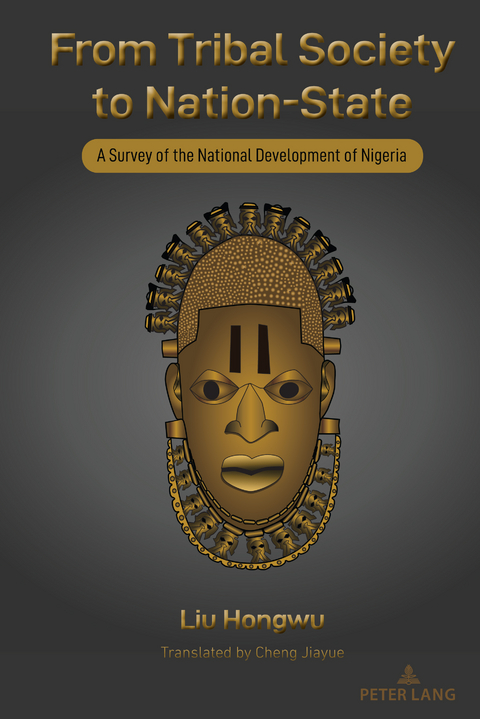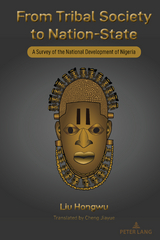From Tribal Society to Nation-State
Peter Lang Publishing Inc (Verlag)
978-1-4331-7724-8 (ISBN)
This book provides a systematic introduction to the century-old history of the making of Nigeria and the related theoretical issues. The introduction is devoted to the unique significance of the writing of country-specific histories of modern African countries and the theoretical issues related to the studies on the historical process of state-building and development in modern African countries. In two broad dimensions, that is, the vertical historical presentation and horizontal structural description, the chapters in the main body systematically review how Nigeria has developed from a traditional tribal society to a modern state over the past century; the political changes, economic growth, social transformation, and cultural reconstruction it has undergone; as well as its achievements, setbacks, problems, and prospects. The author of this book has been observing the state-building and development of African countries for an extended period. The book is a unique, well-structured, and informative work that combines fieldwork with theoretical reflections and empirical experiences with theoretical analysis to explain the growth of young African countries in contemporary times.
Liu Hongwu is Distinguished Professor of the "Changjiang Scholars Program" appointed by the Ministry of Education of China, State Specially Appointed Expert, Secretary General of the Country and Region Studies Review Group of the Academic Degrees Committee of the State Council, Distinguished Expert of Zhejiang Province, Qianjiang Scholar Distinguished Professor, and Expert of the Discipline Planning Review Group of the National Social Science Fund of China. He is Founding Director of the Institute of African Studies at Zhejiang Normal University and Founding Director of the Yunnan University Center of African Studies. Liu is also a member of the Steering Committee of the China-Africa Joint Research and Exchange Program of the Ministry of Foreign Affairs, a director of the Ministry of Education for Regional and Country-Specific Studies of Africa, a director of the African Studies Center for Collaborative Innovation of Zhejiang Provincial Center for Collaborative Innovation in 2011, vice president of the Asia-Africa Association of China, vice president of the Chinese Society for African Studies, and a council member of the Chinese-African People’s Friendship Association.
Introduction: Theoretical Issues Related to the Studies of Political Development in Contemporary African Countries – The Natural and Cultural Environment of Nigeria’s State Development – The Growth and Decline of Ancient Kingdoms in Nigeria – Ancient Nigerian Cultural Heritage and Its Practical Significance – The Black Slave Trade and the Decline of Ancient Nigerian Civilizations – The Establishment and Evolution of the Colony and Protectorate of Nigeria – Toward National Independence and State-Building – Political Structure at the Beginning of Independence and the Political Process in the 1960s – Relentless Efforts to Overcome Tribal Conflict and the Effectiveness – The Political Process from the Mid-1960s to the Mid-1980s – Political Reform in the Babangida Military Government (August 1985–August 1993) – The Political Process from 1993 to 1999 – The 1999 Election and the Birth of the Fourth Republic – The Obasanjo Rule (1999–2007) – Political Evolution from Yar’Adua to Jonathan (May 2007–2013) – Conclusions: Will the 21st Century See Africa’s Rise?.
| Erscheinungsdatum | 04.11.2023 |
|---|---|
| Verlagsort | New York |
| Sprache | englisch |
| Maße | 150 x 225 mm |
| Gewicht | 585 g |
| Themenwelt | Geisteswissenschaften ► Geschichte ► Regional- / Ländergeschichte |
| Geschichte ► Teilgebiete der Geschichte ► Wirtschaftsgeschichte | |
| Sozialwissenschaften ► Ethnologie | |
| Sozialwissenschaften ► Politik / Verwaltung ► Staat / Verwaltung | |
| Sozialwissenschaften ► Soziologie | |
| ISBN-10 | 1-4331-7724-2 / 1433177242 |
| ISBN-13 | 978-1-4331-7724-8 / 9781433177248 |
| Zustand | Neuware |
| Informationen gemäß Produktsicherheitsverordnung (GPSR) | |
| Haben Sie eine Frage zum Produkt? |
aus dem Bereich




